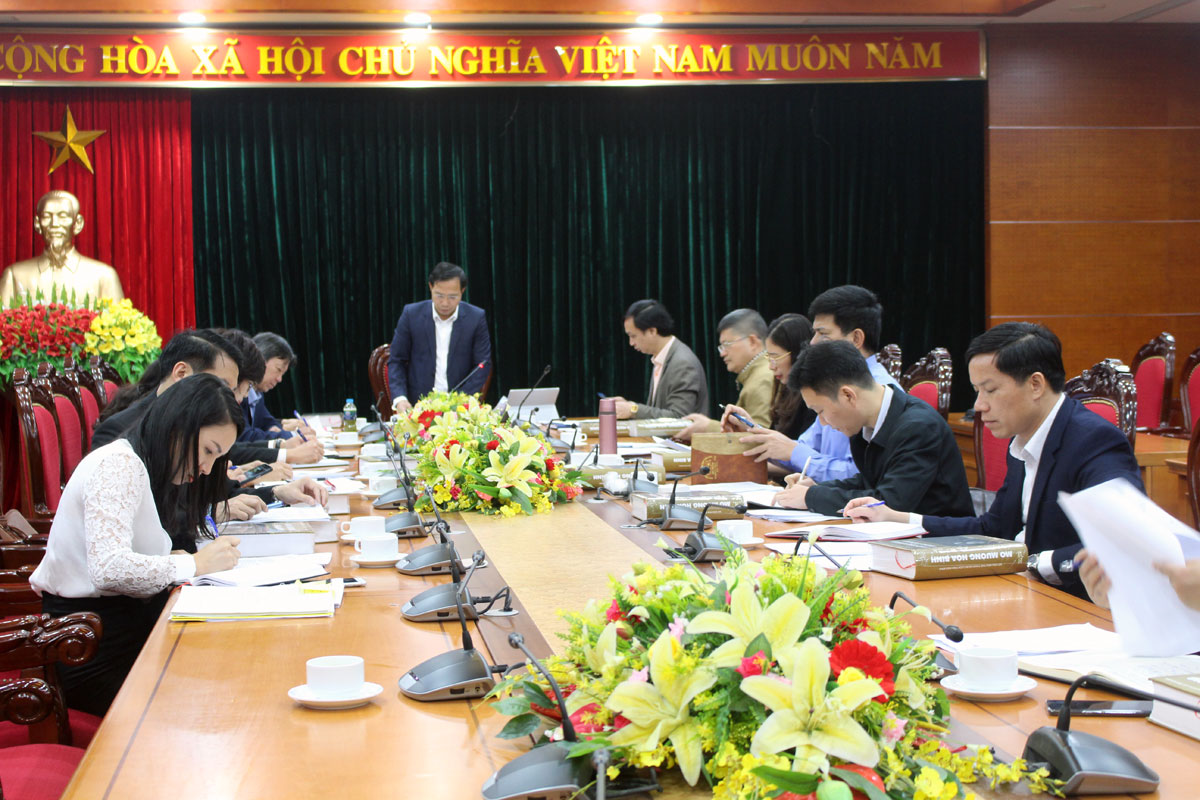
(HBO) – The Hoa Binh steering board on the Mo Muong cultural heritage held a meeting on March 24 to hear reports on the progress of building a dossier for the ritual to be included in the UNESCO’s List of Intangible Cultural Heritage in Need of Urgent Safeguarding. Vice Chairman of the provincial People’s Committee and head of the steering board Nguyen Van Toan chaired the function.

Nguyen Van Toan, Vice Chairman of the
provincial People’s Committee and head of the steering board, concludes the
meeting.
The dossier building project is set to run
between 2021 and 2025 in Hoa Binh with the participation of six other
localities – Hanoi, Son La, Ninh Binh, Thanh Hoa, Phu Tho, and Dak Lak. Divided
into four phase, it is estimated to cost more than 15 billion VND (648,672
USD).
The dossier is expected to be submitted to
the Prime Minister asking for permission for its submission to the UNESCO in
2023 in hope of being recognised in 2025. The accreditation will help increase
the position of the cultural heritage in the national and global levels.
To date, the preparation work has been
underway, with a draft plan and cost estimates done, a roadmap for implementing
the project reported to the provincial Party Committee’s standing board, and
documents seeking feedback of the six localities for their participation sent.
Concluding the meeting, Toan stressed the
project consists of many tasks involving a large number of agencies thus needing
a detailed plan that outlines specific tasks, responsibilities, and deadlines.
The conduction of some work items ought to
be accelerated within 2021 to set the foundation for upcoming tasks, he added.
The building of the project must seek
comments from the Ministry of Culture, Sports and Tourism and localities
involved, the official noted./.
With an increasingly vibrant and widespread emulation movement aimed at building cultured residential areas and cultured families, Yen Thuy District has been making steady progress toward improving both the material and spiritual well-being of its people, while fostering a civilized, prosperous, beautiful, and progressive community.
Once lacking recreational spaces and community facilities, Residential Group 2 in Quynh Lam Ward (Hoa Binh City) has recently received attention for the construction of a new, spacious, and fully equipped cultural house. The project followed the model of state support combined with public contributions in both labor and funding.
The "All people unite to build cultural life" movement, which has been effectively integrated with Kim Boi district’s socio-economic development goals, is fostering a lively spirit of emulation across local residential areas, hamlets, villages, public agencies, and enterprises. In addition, through the initiative, traditional cultural values are being preserved and promoted, while community solidarity and mutual support in poverty reduction and economic development are being strengthened.
A working delegation of the Hoa Binh provincial People’s Committee led by its Permanent Vice Chairman Nguyen Van Toan on June 11 inspected the progress of a project to build the Mo Muong Cultural Heritage Conservation Space linked to tourism services in Hop Phong commune, Cao Phong district.
Born and growing in the heroic land of Muong Dong, Dinh Thi Kieu Dung, a resident in Bo town of Kim Boi district, in her childhood was nurtured by the sweet lullabies of her grandmother and mother. These melodies deeply imprinted on her soul, becoming an inseparable part of her love for her ethnic group's culture. For over 20 years, this love for her hometown has driven Dung to research, collect, and pass down the cultural values of the Muong people to future generations.
In the final days of May, the Ethnic Art Troupe of Hoa Binh Province organized performances to serve the people in remote, mountainous, and particularly disadvantaged areas within the province. These were not just ordinary artistic shows, but they were the meaningful journeys aimed at spreading cultural values, enhancing the spiritual life of the people and contributing to the preservation of ethnic minority cultural identities.



